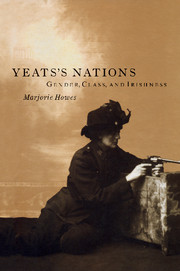Book contents
- Frontmatter
- Contents
- Acknowledgments
- List of abbreviations
- Introduction
- 1 That sweet insinuating feminine voice: hysterics, peasants, and the Celtic movement
- 2 Fair Erin as landlord: femininity and Anglo-Irish politics in The Countess Cathleen
- 3 When the mob becomes a people: nationalism and occult theatre
- 4 In the bedroom of the Big House: kindred, crisis, and Anglo-Irish nationality
- 5 Desiring women: feminine sexuality and Irish nationality in “A Woman Young and Old”
- 6 The rule of kindred: eugenics, Purgatory, and Yeats's race philosophy
- Notes
- Bibliography
- Index
4 - In the bedroom of the Big House: kindred, crisis, and Anglo-Irish nationality
Published online by Cambridge University Press: 06 July 2010
- Frontmatter
- Contents
- Acknowledgments
- List of abbreviations
- Introduction
- 1 That sweet insinuating feminine voice: hysterics, peasants, and the Celtic movement
- 2 Fair Erin as landlord: femininity and Anglo-Irish politics in The Countess Cathleen
- 3 When the mob becomes a people: nationalism and occult theatre
- 4 In the bedroom of the Big House: kindred, crisis, and Anglo-Irish nationality
- 5 Desiring women: feminine sexuality and Irish nationality in “A Woman Young and Old”
- 6 The rule of kindred: eugenics, Purgatory, and Yeats's race philosophy
- Notes
- Bibliography
- Index
Summary
Black fortress of ascendancy,
Beneath whose wasting sway
Sprang crime and strife, so deadly rife -
What rests of thee to-day?
John O'HaganTradition is kindred.
(EX, 312)Yeats's engagement, in the works of his great middle period, with Anglo-Irish nationality and culture is one of the best-known and most controversial aspects of the “politics” of his work. His imaginative construction of the Irish eighteenth century as “that one Irish century that escaped from darkness and confusion” (EX, 345); his praise of Burke, Swift, Goldsmith and Berkeley as iconoclastic figures who represented the flowering of an Ascendancy culture which resisted the modernizing, mechanistic, democratic ideals of the enlightenment; his partial embrace of his own Anglo-Irish heritage; and his interest in the declining political and economic fortunes of the Irish Big Houses have generated a wide range of conflicting critical assessments. For Yeats, Anglo-Irishness was by definition a nationality in crisis, the nationality of an ex-ruling elite whose displacement was already an accomplished fact and an important aspect of their cultural heritage. Most versions of nationality reveal themselves as constructions, despite their efforts to naturalize and conceal their own invention. Yeats's Anglo-Irish nationality, on the other hand, deliberately and elaborately exposes itself as a construction. In fact, its uniqueness as a national identity and its strength as a cultural tradition depend upon that exposure. Anglo-Irishness is a willful, imaginative response to the erosion of material power, the rupture of historical tradition and continuity, and the absence of a stable identity. Yeats's Anglo-Irish meditations offer an analysis of the ways in which gender and sexual discourses are often used to naturalize and legitimize political relations, structures and ideologies.
- Type
- Chapter
- Information
- Yeats's NationsGender, Class, and Irishness, pp. 102 - 130Publisher: Cambridge University PressPrint publication year: 1996



